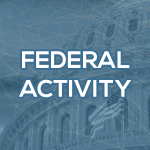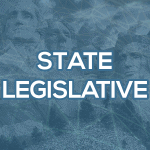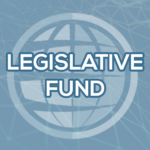Congress is considering a 10-year moratorium on state and local enforcement of “any law or regulation regulating artificial intelligence models, artificial intelligence systems, or automated decision systems.” Passed earlier this month in the U.S. House of Representatives as part of the budget reconciliation bill, the provision faces an uncertain future in the U.S. Senate. The provision must withstand a ruling by the Senate parliamentarian, who enforces rules that bar provisions primarily focused on policy rather than government spending.
Republican senators believe the House language won’t pass the required criteria under Senate rules, but Commerce Committee Chair Ted Cruz of Texas is attempting to work around that issue by tying eligibility for federal broadband expansion funds to the 10-year state moratorium provision.
Other legislative topics receiving attention include bills advancing capital formation through the House Financial Services Committee, proposed reforms related to “debanking” and fair access, CFPB structural changes, cryptocurrency oversight (particularly stablecoin and market frameworks), and bank regulatory capital relief.
On the regulatory side, the CFPB continues to undergo significant upheaval under Acting Director Russell Vought. The agency is awaiting a court decision regarding major workforce reductions. An internal CFPB memo reveals a shift in priorities under the Trump administration, including a return to traditional bank supervision, increased reliance on state enforcement of nonbanks, and a pullback from regulating peer-to-peer lending, digital payments, and remittances.
In a sweeping rollback effort, the CFPB has petitioned a federal court to strike down its own Section 1033 Rule, finalized under the previous administration. The rule was intended to implement Dodd-Frank’s open banking provisions by allowing consumers to share financial data with third parties. CFPB leadership now argues that the rule exceeds statutory authority. While Section 1033 still mandates a rulemaking, the agency’s current plans remain uncertain.
In May, the CFPB formally rescinded over 65 guidance documents, including policy statements, interpretive rules, and advisory opinions, as part of a broader deregulatory shift. It also asked the court to vacate the Personal Financial Data Rights Rule (Open Banking Rule), dismissed at least 18 lawsuits, and revoked supervisory designations for select nonbanks.
Recently, the CFPB noted that the “Defining Larger Participants of the Consumer Debt Collection Market” rule is also under review. The rule establishes which entities in the debt collection industry are considered “larger participants” and are therefore subject to the CFPB’s supervisory authority.
RMAI monitors, tracks, and responds to legislative and regulatory activity in all 50 states as the need arises. Backed by RMAI’s State Legislative Committee and a team of state lobbyists, RMAI educates legislators and regulators about the industry and the negative impacts or unintended consequences a bill would have on businesses and consumers. RMAI has retained lobbyists in 10 states (which ties a record) so far in 2025: California, Colorado, Maine, Michigan, Nevada, New Mexico, New York, Oregon, Vermont, and Wyoming.
If you have an interest in volunteering in RMAI’s grassroots advocacy efforts, please contact RMAI General Counsel & Senior Director of Government Affairs David Reid at (916) 779-2492 or [email protected].
Top Issue: Medical Debt
Medical debt legislation remains the most active subject matter that RMAI is lobbying on in 2025. Currently, we are tracking 139 medical debt bills in the nation and are actively lobbying bills with a strong likelihood of passage in over a dozen states. RMAI’s singular concern on these bills is the definition of “medical debt.” We are advocating for a narrow definition that ensures the definition does not include various consumer credit products, including credit cards, bank loans, and home equity lines of credit. There are 33 states (also Puerto Rico) with medical debt bills, including: Arkansas, Connecticut, Delaware, Florida, Georgia, Hawaii, Illinois, Indiana, Kentucky, Maine, Maryland, Massachusetts, Minnesota, Missouri, Montana, Nebraska, Nevada, New Hampshire, New Mexico, New York, North Carolina, Oklahoma, Oregon, Pennsylvania, Rhode Island, South Carolina, South Dakota, Tennessee, Texas, Vermont, Virginia, Washington, and Wyoming.
Several important non-medical debt bills RMAI is engaged on include:
California SB 706 – This bill would: (1) prohibit a charged-off consumer debt from being sold or assigned more than one year after the debt was charged off; (2) require a charge-off creditor to notify the consumer when the creditor sells or assigns a charged-off consumer debt to a debt buyer; (3) prohibit an action from being brought to recover a charged-off consumer debt within two years after the date the creditor provided a notice of default or delinquency to the consumer or 90 days after the debt was charged off, whichever occurs earlier; and (4) prohibits a debt buyer from bringing an action to recover a charged-off consumer debt after one year from the date the debt was charged off. [RMAI is in strong opposition, along with a large coalition within the financial services industry. This bill is the first, to RMAI’s knowledge, to reduce the statute of limitations to below 3 years on a consumer debt. This bill would essentially impose a 90-day SOL on banks and a one-year SOL on debt buyers. This bill has died with the help of intense lobbying by RMAI and the industry.]
Nevada SB 142 – This bill would, among other things: (1) amend the wage garnishment laws to exempt up to 90% of weekly disposable income; (2) exempt $5,000 in a personal bank account, (3) require a CPI adjustment to exemptions every three years; and (4) increase the homestead exemption to equity in property up to $605,000 and outlines conditions under which proceeds from the sale of a homestead remain exempt. [RMAI strongly opposes the wage and bank garnishment provisions. This bill passed both houses of the legislature on a party line vote by the democratic majority. The Governor recently vetoed this bill because of a coordinated education effort led by RMAI and the industry with the Governor’s staff.]
New York AB 5537 / SB 4271 – This bill would establish a state-wide debt collector license in New York under the authority of the Department of Financial Services (the same agency that licenses the banking and insurance industries and which for the last 11 years has promulgated rules for debt collectors). [RMAI has been working with the legislature on amendments to various versions of this bill for years and has been successful in obtaining most of our requested amendments in the current draft. The bill has passed the Senate but passage in the Assembly this year is unlikely.]
New York AB 8427-A/SB 8416 (NY Attorney General Program Bill) – This bill would enact the “Fostering Affordability and Integrity through Reasonable (FAIR) Business Practices Act” to expand the attorney general’s ability to protect New Yorkers from unfair, deceptive and abusive business practices. [RMAI was in strong opposition due to the bill containing: (1) an enhanced private right of action where the consumer does not have to show an actual injury and (2) a public registry of all UDAAP settlements. RMAI has had three very constructive meetings with the New York Attorney General’s Office in the past month explaining our opposition. Through RMAI’s efforts and that of the New York Business Council, of which RMAI is a member, the bill was amended to resolve the concerns raised by RMAI (although not all of the concerns raised by the broader business community). Removed from the version which passed the Senate was language that: (i) allowed a third party to bring a private right of action on behalf of others without their consent, (ii) allowed the plaintiff to bring suit without actual injury, (iii) created a public registry, and (iv) created higher penalties for a private right of action. With these changes, the bill is generally in line with existing UDAAP laws from other states. This bill is likely to pass the Assembly and to be sent to the Governor for signature.]
Second Circuit Holds Merely Reporting Inaccurate is Insufficient for FCRA Liability
Suluki v. Credit One Bank, NA., No. 23-721-cv, 2025 U.S. App. LEXIS 13008 (2d Cir. May 28, 2025)
Following the advice of her mother, a consumer applied for a credit card when she started college. Her mother helped her with the credit card application and was with her when she applied. The mother provided similar assistance when the consumer applied for other credit cards and sent her money to make the payments.
Another card from a bank was applied for online by an individual that used the consumer’s name, birthdate, the address of her childhood home in Brooklyn, Social Security Number, and an email address comprised of the consumers first initial and last name. Someone made payments on the card using a bank account shared by the consumer and her mother.
Thereafter, the consumer’s application for an apartment was rejected and when she reviewed her credit reports she was “dismayed to discover that while she was attending college, she was the victim of identity theft, as [the mother] opened various accounts in [the consumer’s] name and maxed out some of [the consumer’s] pre-existing accounts.”
The consumer called the bank referenced above to report the account had been fraudulently opened by her mother without her knowledge or permission. The bank closed the account, opened an investigation, and asked the consumer to obtain a police report. The bank then called the mother who stated the account was not fraudulently opened and “that she and [the consumer] opened the account together when [the consumer] was in college, with the understanding that [the mother] would make payments on the card to assist [the consumer] with building her credit. The bank informed the mother of the balance owed, which she paid.
The consumer disputed the account with the credit reporting agencies (CRAs) several times, and that triggered an investigation by the bank which ultimately determined no fraud was involved.
Skipping past some of the additional drama, the consumer filed a lawsuit against the bank alleging it violated the Fair Credit Reporting Act and “moved for summary judgment contending that: (1) [the bank’s] reporting to the CRAs that the account belonged to [the consumer] was inaccurate as a matter of law; (2) [the bank] failed to properly report the results of its investigation to the CRAs; and (3) [the bank’s] investigation of her identity theft claim was unreasonable as a matter of law. The bank “moved for summary judgment contending that: (1) its investigation was reasonable as a matter of law; and (2) whether or not its investigation was reasonable, it did not act willfully and therefore damages were unwarranted.”
The trial court granted the bank’s motion and the consumer appealed.
The U.S. Court of Appeals for the Second Circuit agreed with the trial court that there was a genuine issue of material fact regarding the accuracy of the bank’s determination. However, it explained that it did not have to reach that issue because “[e]ven assuming the information provided by [the bank] was inaccurate, however, the inaccuracy was not, by itself, sufficient to create liability under the FCRA, for the FCRA ‘is not a strict liability statute.’”
The Court noted that “[b]oth parties moved for summary judgment as to whether [the bank’s] investigation was reasonable,” but that it did not have to address that question because “as the district court held, no reasonable investigation into [the consumer’s] claims would have led [the bank] to reach a different conclusion . . . no reasonable jury could find that [the bank] willfully violated the FCRA, thereby precluding an award of punitive damages for [the bank’s] purportedly unreasonable investigation.”
The consumer claimed the bank failed to consider various pieces of information, but the Court found, after a detailed review of that information, “even with the benefit of discovery, [the consumer] did not present evidence to show that there were reasonable steps that [the bank] could and should have taken or that there was additional evidence that it could or would have found that would have shown that [the mother] opened the account without [the consumer’s] permission. Because no reasonable investigation would have led to a different result, summary judgment in favor of [the bank] was appropriate.”
Based on this, the Court of Appeals affirmed the trial court’s judgment.

RMAI Legislative Fundraising Committee Outreach
The Legislative Fundraising Committee is working to ensure that RMAI can continue its advocacy efforts. With new legislation that can impact your business, it is more important than ever to ensure that your voice is heard. This year, RMAI has tracked 568 bills across the country, covering issues like medical debt, AI, data privacy, and more. The Legislative Fundraising Committee will continue to reach out to members for donations, so keep an eye out for correspondence. Your donations make a difference, allowing RMAI to lobby on your behalf across the country.
If you’d like to contribute to the Legislative Fund, you can Donate Here. We will add your Company name to our list of Legislative Fund Contributors on our website.
About the Legislative Fund
RMAI actively monitors and responds to state and federal measures affecting how our members do business. Your contributions to the Legislative Fund extend the reach of RMAI’s advocacy across the country where and when needed. Read more about the Legislative Fund.

2025 Webinar Programming
Register for our June 24th U.S. Privacy Law Update 2025 webinar where our presenters, who are members of the Privacy & Data Security Working Group, will provide an overview of comprehensive state-level consumer privacy laws in the U.S.
Recorded Webinar
Recorded on May 6, 2025 you can register for New York City’s Twisted Path to an Amended Debt Collection rule, this presentation will explore communication restrictions, the limited creditor exemptions and why they are more limited than you might think, verification, validation and noticing requirements, and why this latest version is bound to harm consumers and the credit industry.
Recorded on May 8, 2025 you can register for California DFPI Examinations Under the Debt Collection Licensing Act, in this webinar our presenters will lead a robust discussion on preparing for a California DFPI Debt Collector Licensee (DCL) exam.
Click here for more information on our live and recorded educational webinars. Contact Shannon Parod at [email protected] to find out more about sponsoring an RMAI webinar.

Congratulations to our new and renewed Certified Receivables Compliance Professionals (CRCP), and renewed Certified Receivables Businesses (CRB)!
CRCP New
Elizabeth Hendricks, TrueAccord/TrueML Products
Anthony Pirotta, Credit Control
James White, Orbita Capital Group
Jared Forhan, Garnet Capital Advisors
Joel Blackburn, Cornerstone Licensing
CRCP Renewals
Zachary Tharrett, Velocity Portfolio Group
Zachariah Shlachtman, LMM, Inc.
Kelli Edmonds, Kota Consulting
William Marohn, Tobin & Marohn
Marc Maiorca, Southwood Financial
Andrew Carlson, Garnet Capital Advisors
Bill Sorgatz, The Bureaus Inc.
Shantal Pascal, National Recovery Associates
Sarah Daley, Galaxy Capital Acquisitions
CRB Renewals
CBE Companies
TrueAccord
View all certified businesses and vendors.
View all certified individuals.
Earning Your Certified Receivables Compliance Professional (CRCP) Designation Is Easy!
For individuals looking to take the step to become individually certified, you may already be on your way if you have done any of the following in the past two (2) years:
- Attended either an RMAI Annual Conference or Executive Summit and earned education credits
- RMAI always offers at least 15 credits of education at the Annual Conference and 12 credits of education at the Executive Summit toward the 24-credit requirement.
- Attended any RMAI webinars (live or recorded)
- Attended or earned any education (in person or webinar) from any of our Authorized Education Providers, including ACA, NCBA, DCS, CRS, and many more.
- Earned CLE credits through your state bar that are relevant to the receivables management industry.
If you fall under any of the areas listed above or if you aren’t sure where you stand with your certification credits, please reach out to Shannon Parod-Tsui at [email protected] to get more information including:
- Calculating your credits
- Providing credit forms from RMAI conference
- Certification requirements & resources including:
View our full list of certification resources.

Take Advantage of Educational Opportunities for You and Your Team
Remember, one of your benefits of membership with RMAI is complimentary and discounted registration for live and recorded webinars. Not only do these educational webinars advance your knowledge, but they are an excellent training resource for your team, and the credits count toward the Certified Receivables Compliance Professional (CRCP) designation. Catch them live or watch the recording after – you can see all previously recorded webinars on our website here.
As an RMAI member, you also get a discount on sponsoring educational webinars. Showcase your company by sponsoring a webinar. Sponsorship gets you and your brand in front of a captive audience of our most engaged members for the live webinar as well as for the following 12 months on the recorded webinar. You will also have the option to give a 2–3-minute pitch at the beginning of the live webinar to introduce your product. Contact Shannon Parod to sponsor a webinar!
Welcome, New Members
- Krew, Inc. | CA
- Collectors Insurance Agency, Inc. | MN
For a complete list of RMAI members, login to check out the Member Directory.

LEGISLATIVE FUND CONTRIBUTORS JUNE 1, 2024 – JUNE 13, 2025
DIAMOND
Absolute Resolutions Corp.
Cavalry Investments, LLC
Crown Asset Management, LLC
Financial Recovery Services, Inc.
Resurgent Holdings, LLC
Second Round, LP
TRAKAmerica
Velocity Portfolio Group, Inc.
TITANIUM
Cascade365 Family of Companies
Garnet Capital Advisors, LLC
Rausch Sturm, LLP
PLATINUM
Andreu, Palma, Lavin & Solis, PLLC
Blitt and Gaines, P.C.
DebtNext Software, LLC
InvestiNet, LLC
Klima, Peters & Daly, P.A.
Pharus Funding, LLC
Stenger & Stenger P.C.
T & I Enterprises, LLC
Velo Law Office
GOLD
D & A Services, LLC
SILVER
Firstsource
Halsted Financial Services, LLC
National Credit Adjusters, LLC
Pressler, Felt and Warshaw, LLP
BRONZE
Central Portfolio Control, Inc
Corporate Advisory Solutions, LLC
Equabli, Inc
Resurgence Capital, LLC
Security Credit Services, LLC
Stillman Law Office
Superlative RM
Tromberg, Morris & Partners, PLLC
Troy Capital, LLC
BRASS
Acctcorp International, Inc.
Advancial Federal Credit Union
AgreeYa Solutions, Inc.
Aldridge Pite Haan, LLP
ARM Compliance Business Solutions LLC
ARS National Services, Inc.
Balbec Capital
Basham & Scott, LLC
Bayview Solutions, LLC
CBE Companies
Cedar Global Solutions LLC dba Remote Scouts
Channel Payments, Inc.
CMS Services
CNG/Axcess Financial Services, Inc.
Collection Attorneys USA LLC
CompuMail Information Systems
ConServe
Cornerstone Licensing Services
Couch Lambert
Credit Control, LLC
Credit Corp Solutions Inc.
FDR Alliance LLC
FLOCK Specialty Finance
FMA Alliance, Ltd
ForgiveCo PBC Inc
Frost Echols LLC
G. Reynolds Sims & Associates, P.C.
Genesis Recovery Services
Gordon, Aylworth & Tami, P.C.
Grassy Sprain Group, Inc
Guglielmo & Associates, PLLC
InterProse
Jefferson Capital Systems, LLC
Kino Financial Co., LLC
Law Office of James R. Vaughan, P.C.
Mandarich Law Group LLP
Markoff Law LLC
Moss & Barnett, P.A.
Mountain Peak Law Group, PC
National Debt Holdings, LLC
NCB Management Services, Inc.
Nelson & Kennard
NICE
Nuvei Technologies Inc.
PaymentVision (Autoscribe)
PCI Group Inc.
Phin Solutions, LLC
Plaza Services
Premium Asset Recovery Corp (PARC)
RAS LaVrar LLC
Reassigned Numbers Database (RND)
Remitter
Revenue Assistance Corporation dba Revenue Group
Robinson Hoover & Fudge, PLLC
SAM – Solutions for Account Management, Inc.
Scott & Associates, PC
Shepherd Outsourcing, LLC
Slovin & Associates
Smith Debnam Narron Drake Saintsing & Myers, LLP
SMS Financial, LLC
Stone Creek Financial Inc.
Stone, Higgs & Drexler
Suttell & Hammer
The Cadle Company
The Moore Law Group
The Oakes Law Firm, LLC
Tratta
Troutman Pepper Locke
Vertican Technologies, Inc.
Womble Bond Dickinson
Zarzaur & Schwartz, P.C.
OTHER
Actuate Law, LLC
Alliance Credit Services, Inc.
Bedard Law Group, P.C.
C & E Acquisition Group, LLC
Caddis Funding LLC
CASA Receivables Management, LLC
Ceteris Portfolio Services LLC dba J.J. Marshall & Associates
Cohen & Cohen Law, LLC
Complete Credit Solutions, Inc.
Consuegra & Duffy, PLLC
Convoke, Inc.
Credit Management Corporation
Denali Capital, LLC
First Credit Services, Inc
First Financial Asset Management, Inc. (FFAM 360)
Harvest Strategy Group, Inc.
Hudson Cook, LLP
Indiana Receivables, Inc.
Kaleo Legal
London & London
Martin Golden Lyons Watts Morgan PLLC
MauriceWutscher LLP
McGlinchey Stafford, PLLC
National Recovery Associates, Inc.
National Recovery Solutions, LLC
Payment Savvy, LLC
Pro Forma Inc
SIMM Associates, Inc.
Sonnek & Goldblatt, Ltd.
Tavelli Co., Inc. dba Tavco Credit Services
The Law Offices of Ronald S. Canter, LLC
Vargo & Janson, P.C.


















